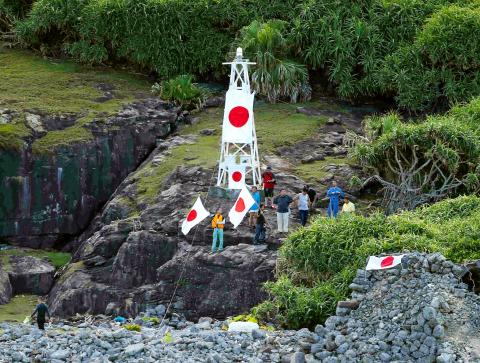Nationalists raised Japanese flags on an island at the heart of a corrosive territorial row with China yesterday, in a move likely to further inflame tensions with Beijing.
About a dozen members of the right-wing group Gambare Nippon (“Hang In There, Japan”) swam ashore, an Agence France-Presse (AFP) journalist witnessed, from a 20-boat flotilla carrying activists and lawmakers.
The landing comes just days after Tokyo deported pro-Beijing protesters who had landed on the island, part of a chain administered by Japan, but claimed by China, which had warned against acts “harming” its territorial sovereignty.

Photo: AFP
Tokyo politician Eiji Kosaka, one of the men who made it to the island, said the group had planted Japanese flags on a hillside and on the shore.
“This is undoubtedly Japanese territory,” he told an AFP reporter aboard the flotilla on his return. “On the mountain we found [the ruins of] Japanese-style houses that had places for drying fish.”
“It is very sad that the Japanese government is doing nothing with these islands,” he said, adding that the nationalists’ expedition had been “a great success.”
The 150 people who had made the voyage, including eight parliamentarians, sailed back to far southwestern Ishigaki yesterday. They had spent about five hours at the islands, known as the Senkaku Islands in Japan and the Diaoyutai Islands (釣魚台) in Taiwan.
Japanese Coast Guard ships had urged the activists not to land, with officers boarding some of the vessels to question people. No arrests were made.
China reacted with vehemence.
“Japanese right-wingers illegally violated China’s territorial sovereignty,” a statement quoted foreign ministry spokesman Qin Gang (秦剛) as saying. “The foreign ministry has already lodged solemn representations and expressed strong protest to the Japanese embassy in China and urged Japan to stop actions which harm China’s territorial sovereignty.”
Before the voyage, Kenichi Kojima, a local politician from Kanagawa, near Tokyo, said the trip was about who owned the archipelago, whose seabed is believed to harbor rich mineral resources.
“I want to show the international community that these islands are ours. It is Japan’s future at stake,” he said.
Organizers, who had been refused permission by Tokyo to go ashore, said ahead of their departure that they would be holding a ceremony aboard boats to remember some of those who died in World War II.
In Tokyo, Japanese Vice Foreign Minister Tsuyoshi Yamaguchi said established practice was for only government officials to land there.
However, he added: “In principle, it is alright for Japanese people to visit Japanese territory.”
The dispute over the islands is one of the major stumbling blocks — along with issues related to Japan’s military occupation of parts of China during World War II — to smooth relations between Asia’s two giant economies.
Tensions spiked as Japan deported 14 pro-China activists who sailed to the islands from Hong Kong.
Some managed to land on Uotsurijima, the largest island, becoming the first non-Japanese to set foot on any part of the archipelago since 2004.

A Ministry of Foreign Affairs official yesterday said that a delegation that visited China for an APEC meeting did not receive any kind of treatment that downgraded Taiwan’s sovereignty. Department of International Organizations Director-General Jonathan Sun (孫儉元) said that he and a group of ministry officials visited Shenzhen, China, to attend the APEC Informal Senior Officials’ Meeting last month. The trip went “smoothly and safely” for all Taiwanese delegates, as the Chinese side arranged the trip in accordance with long-standing practices, Sun said at the ministry’s weekly briefing. The Taiwanese group did not encounter any political suppression, he said. Sun made the remarks when

The Taiwanese passport ranked 33rd in a global listing of passports by convenience this month, rising three places from last month’s ranking, but matching its position in January last year. The Henley Passport Index, an international ranking of passports by the number of designations its holder can travel to without a visa, showed that the Taiwan passport enables holders to travel to 139 countries and territories without a visa. Singapore’s passport was ranked the most powerful with visa-free access to 192 destinations out of 227, according to the index published on Tuesday by UK-based migration investment consultancy firm Henley and Partners. Japan’s and

BROAD AGREEMENT: The two are nearing a trade deal to reduce Taiwan’s tariff to 15% and a commitment for TSMC to build five more fabs, a ‘New York Times’ report said Taiwan and the US have reached a broad consensus on a trade deal, the Executive Yuan’s Office of Trade Negotiations said yesterday, after a report said that Washington is set to reduce Taiwan’s tariff rate to 15 percent. The New York Times on Monday reported that the two nations are nearing a trade deal to reduce Taiwan’s tariff rate to 15 percent and commit Taiwan Semiconductor Manufacturing Co (TSMC, 台積電) to building at least five more facilities in the US. “The agreement, which has been under negotiation for months, is being legally scrubbed and could be announced this month,” the paper said,

Japan and the Philippines yesterday signed a defense pact that would allow the tax-free provision of ammunition, fuel, food and other necessities when their forces stage joint training to boost deterrence against China’s growing aggression in the region and to bolster their preparation for natural disasters. Japan has faced increasing political, trade and security tensions with China, which was angered by Japanese Prime Minister Sanae Takaichi’s remark that a Chinese attack on Taiwan would be a survival-threatening situation for Japan, triggering a military response. Japan and the Philippines have also had separate territorial conflicts with Beijing in the East and South China